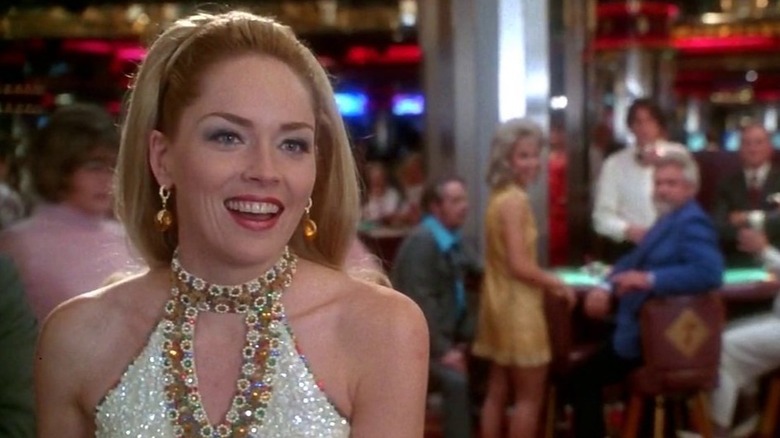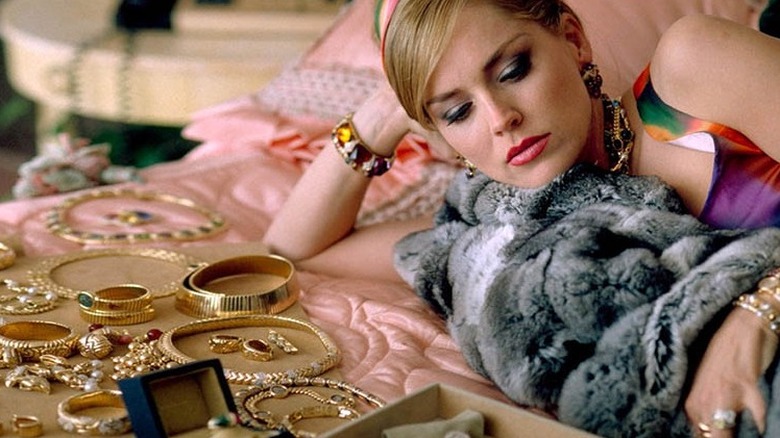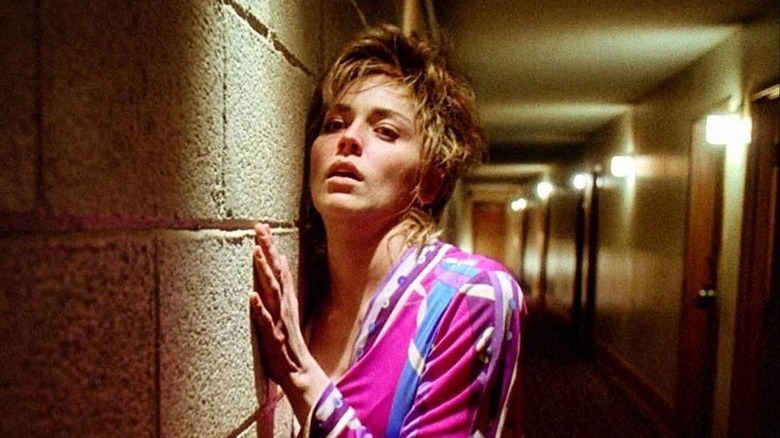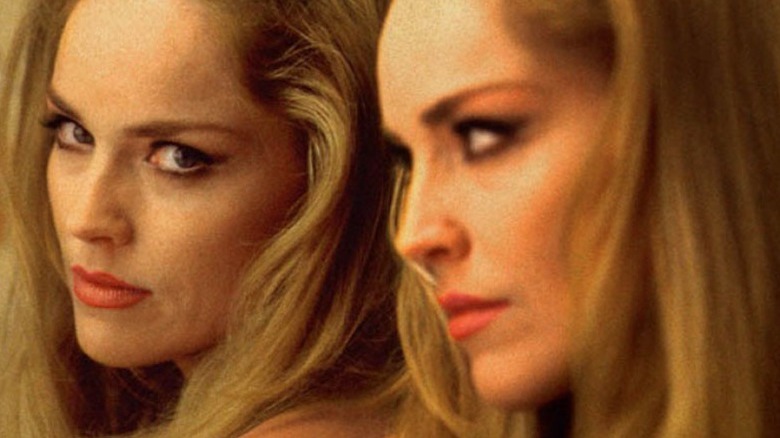How Martin Scorsese Changed The Course Of Sharon Stone's Career
Early in Martin Scorsese's 1995 film "Casino," we are introduced to one of the most troubling, electric characters in the filmmaker's body of work. Ginger (Sharon Stone) is winning big, drawing the attention of fastidious casino boss Ace Rothstein (Robert De Niro). To the tune of Mickey & Sylvia's "Love is Strange," he sees her in freeze frame, and falls in love instantly. This love will ultimately tear everything apart.
Ace tries his best to buy and own Ginger, thinking that by marrying Ginger he's rescuing her from a life of hustling in the margins of the Las Vegas casinos. In truth, he's giving her something far worse. Pressure turns her to substance abuse and addiction — by the end of the movie, she's kidnapped her child and has attempted to have her husband killed.
In short, Ginger's not a very sympathetic character.
The all-out recklessness and petty greed of the role demanded an actress capable of being profoundly unlikeable onscreen. She would need to be stunning, too, and inventive enough to hold her own with actors like De Niro and Joe Pesci. Sharon Stone, who had just appeared in Sam Raimi's excellent Western "The Quick and the Dead," quickly became the filmmakers' only choice, and in playing the part, she beat the "wisdom" of those who told her to turn it down. The role changed the course of her career.
What made Casino different?
On the surface, "Casino" is a neon-lit, stylish retread of Martin Scorsese's earlier work in the gangster genre. In particular, it draws from his 1990 classic "Goodfellas," borrowing that movie's breakneck pace and many of its actors, including De Niro, Pesci, and Frank Vincent. Like "Goodfellas" it's a movie with fourth-wall-breaking voice-over from its characters (if not as good as that of "Goodfellas"), wall-to-wall pop songs from the '50s to the '80s, and a true story compiled by crime writer Nicholas Pileggi. It was so clearly a spiritual successor that it wasn't uncommon for contemporaneous reviews to lament that it was treading familiar ground.
But "Casino" blows everything up, injecting the "Goodfellas" formula with excess and a gross, overwhelming sheen courtesy of cinematographer Robert Richardson. It's a movie about Las Vegas in more than one sense, and it treats the city like a gleaming nightmare. While "Goodfellas" seeks to undercut the warm nostalgia of its first half with a grim second half, "Casino" blasts right through the nostalgia from the beginning, spending three hours in hell.
"Casino" removes the faux-camaraderie of the "Goodfellas" gangsters and unearths the brutality of the money-making machine that is organized crime. "Goodfellas" had a love story of sorts – complicated, abusive, passionate, but based on mutual attraction and a life built together, if nothing else. "Casino" gives us a relationship that's almost purely transactional, between Ace and Ginger.
Taking a chance
"Casino" was a tough sell for Stone's team. "Sharon, we don't think you should go there," Stone recalled being told in a 1996 interview with The Guardian.
She was in her mid-30s at the time, and had just come off several major roles in hit movies like Paul Verhoeven's shocking and sexually-charged 1992 film "Basic Instinct" after nearly a decade of obscure toil. Her obvious beauty and steely gaze — forged during her time as a young model before her shift to acting — was a major asset, as was her tough voice, which contrasted memorably with her traditional good looks. As Stone herself put it, "I looked like a Barbie doll and then I had this voice like I spend my life in a bar." Her team wondered if it would be worth potentially throwing away her newfound stardom to play a difficult, exhausting, alienating role like Ginger.
It was a risky move, and Stone needed some security before signing onto it. As she recalled in The Guardian interview, "I got together with Marty [Scorsese] and Bob [De Niro] and they were like, 'Give it all to us, baby, just let her rip if you've got it, we want it, let's see what you can do.'" Scorsese may admit to some weaknesses with directing, but his work with actors is one of his best traits, always emphasizing their comfort and creativity above all. Stone was no exception.
Stone's throw
Sharon Stone now looks back on the collaboration that birthed "Casino" with fondness. Speaking with Stephen Colbert, she would say that "Marty Scorsese... was willing to create a space with me" and that was incredibly valuable for her as an actress who'd only recently achieved major stardom. Her guest appearance in Scorsese's 2019 Bob Dylan mock/documentary "Rolling Thunder Revue" speaks to that connection.
Her performance as Ginger, far from the misogynistic caricature of a gold-digging harpy she could have been, evokes something real and tragic. She manages to be nuanced even when she ties her kid up to a bed, even as Ace is showering her with gifts. In "Conversations with Scorsese," the director called Ginger the "poor woman who's stuck in the middle," but it's hard not to notice how much the movie is driven by her actions. Stone totally reorients the movie's center of gravity around Ginger's needs and addictions, finding the human center of the movie's portrayal of the vast casino trade.
For her performance, she was nominated for an Oscar. More importantly, she created a wickedly complex character that's still exciting and dangerous, proving she was smart in following her instincts over those who told her no.



